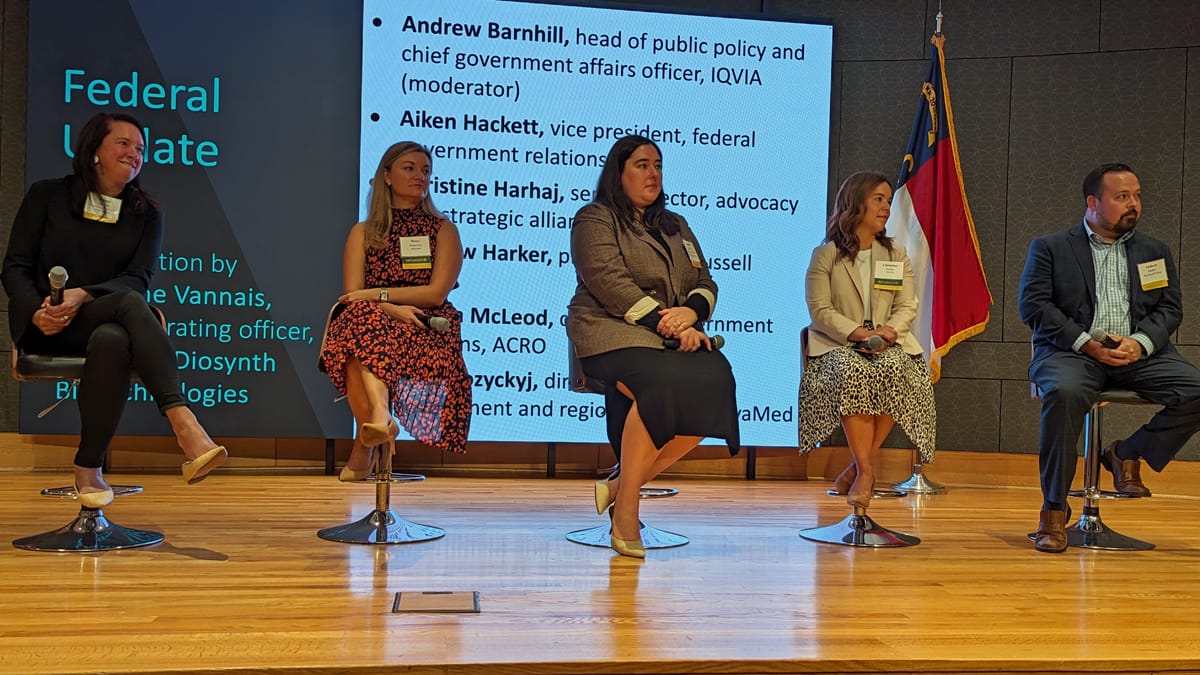2023 Annual Meeting brings name change, hosts 200
2023 Annual Meeting brings name change, hosts 200
NCBIO became the NC Life Sciences Organization at its 2023 Annual Meeting held Oct. 4 at the NC Biotechnology Center, and approximately 200 member representatives enjoyed networking and engaging panel discussions.
Novartis’ Emily Chee delivered the meeting’s keynote address and shared the promise of gene therapy as she described Novartis’s success in launching Zolgensma, a gene therapy for spinal muscular atrophy.

The 2023 Annual Meeting was possible thanks to our generous sponsors.
- Platinum sponsors were American Laboratory Trading, Avantor delivered by VWR, Azzur Group and Kymanox.
- Gold sponsors were the Conafay Group, FUJIFILM Diosynth, Grifols, JBK Associates, Marsh McLennan Agency and PSC Biotech.
- Silver sponsors were AdvaMed, Alexandria Real Estate Equities, Biocryst, Mispro, PHCbi, UCB, UniClean and YourBio Health.
- Bronze sponsors were Acadia, Alira Health, Amgen, Longfellow Real Estate Partners, NIIMBL, Nikon, Novozymes, PhRMA and Smith Anderson.
Following the keynote and first panel, NCLifeSci President Laura Gunter presented a slate of nominees for new members for the NCLifeSci Board of Directors to be considered by the membership. The nominees were
- Andrew Barnhill, Head of Public Policy, Global Legal, IQVIA;
- Rachel Hardin, Head, Life Sciences Business and Market Development, SAS;
- Buck Phillips, CFO and COO, Ribometrix;
- Russ Read, Executive Director, National Center for the Biotechnology Workforce, who will be filling the remaining term of a member who vacated a seat (2023-2025); and
- Daniel VonDielingen, Site Head, Lilly RTP.
A motion was made to approve the slate of nominees as presented and seconded. The motion was approved unanimously. Gunter then recognized the recipients of the 2023 Sam Taylor Memorial Scholarships in the Life Sciences, three of whom were in attendance.
2023 NCLifeSci Annual Meeting Keynote Address

Emily Chee, general manager, Americas for Novartis Gene Therapies, said that gene therapies represent an ideal treatment approach for patients with rare diseases, either as a disease modifying therapy or as a real cure in some cases. Novartis is focused on spinal muscular atrophy, which afflicts about one out of every 10,000 people.
Prior to treatments being available, SMA was a leading cause of the genetic cause of death in infants. Children with SMA cannot make a protein required to maintain normal motor neuron function. SMA can affect a baby’s ability to swallow, breathe, sit and walk and usually results in premature death.
Novartis’ Zolgensma has been a very successful gene therapy launch, with over 3,400 patients treated worldwide. Chee shared the story of Matteo, a boy who was one of the first patients in the world treated with Zolgensma. Matteo is now eight years old and doing well.
Producing a gene therapy for patients comes with unique challenges, Chee said. They can be expensive and difficult for patients to access.
Manufacturing gene therapies is different from manufacturing small molecules. It is a complex process that requires the use of a virus to deliver the gene to the body. Gene therapies are often customized for each individual patient, so they cannot be stored ready to use at a hospital or pharmacy.
Chee said that the CEO of Novartis, Vasant Narasimhan, believes that gene therapy is one of the key platforms for Novartis in the future. She said he is confident that Novartis will be able to bring more gene therapies to market in the coming years.

The day’s first panel, “Federal Update,” brought experts to the stage to discuss issues of concern in Washington, D.C. Christine Vannais, COO of FUJIFILM Diosynth Biotechnologies and NCLifeSci board member, introduced the panel, which was moderated by Andrew Barnhill, head of public policy and chief government affairs officer at IQVIA.
The panel comprised
- Aiken Hackett, vice president, federal government relations, BIO;
- Christine Harhaj, senior director, advocacy and strategic alliances, PhRMA;
- Andrew Harker, principal, The Russell Group;
- Sophia McLeod, director of government relations, ACRO; and
- RoxyKozyckyj, director of state government and regional affairs, AdvaMed.
Some of the specific policy priorities that the panelists discussed include:
- The Farm Bill: The Farm Bill is a major piece of legislation that is reauthorized every five years. The panelists discussed the importance of ensuring that the Farm Bill supports the development and use of new bio-solutions that can help to improve the climate and reduce the use of pesticides.
- The Plant Biostimulant Act: This bill would provide a federal definition for plant biostimulants. This is important because it would create a clear pathway for the development and commercialization of these products.
- The Inflation Reduction Act: The panelists discussed the importance of mitigating the worst impacts of this law and shaping its implementation.
- The Orphan Cures Act: This bill would allow for drugs with multiple indications for rare diseases to be excluded from negotiations under the Inflation Reduction Act. This is important because it would help to ensure that companies continue to invest in the development of treatments for rare diseases.
The panelists addressed the current state of privacy legislation in the United States and noted that there is a patchwork of state laws in place and that there is a need for a federal law to provide uniformity and clarity.
At the federal level, there is no comprehensive privacy law, but there have been efforts to pass one. In the last Congress, the American Data Privacy Protection Act was introduced, but it did not pass. The panelists noted that there is some interest in passing a federal privacy law in the current Congress, but it is unclear whether there is enough support to pass a bill.
At the state level, there are currently 15 states with comprehensive privacy laws in place. These laws vary in their scope and requirements, but they generally give consumers the right to access, delete and opt out of the sale of their personal data.
The panelists discussed the challenges of complying with the patchwork of state privacy laws. They noted that the costs of compliance can be significant, and that it can be difficult to keep track of the different requirements. They also noted that the patchwork of laws can create uncertainty for businesses, as it is not always clear what the requirements are in a particular state.
The panel moved on to discuss the reauthorization of the Pandemic and All Hazards Preparedness Act and the Biden administration's investment in state and local communities. PAHPA is a five-year reauthorization that expired on Sept. 30. The House and Senate have passed different versions of the reauthorization bill, and it is unclear when a final bill will be passed. The panelists discussed some of the key provisions that they hope to see in the final bill, such as reauthorizing the Strategic National Stockpile and the Medical Countermeasures Priority Review Voucher program.
The panelists talked about the importance of addressing antimicrobial resistance and the potential of the PASTEUR Act to do so. The PASTEUR Act would create a subscription contract that establishes a guaranteed marketplace for new antimicrobial products.
The panelists also covered the TCET rule, which was introduced by CMS in June. The TCET rule is intended to set standards for covering emerging technologies. The panelists noted that the rule limits coverage to five technologies per year and does not cover diagnostics or technologies that do not currently have a benefit category. They are working to address these limitations through a legislative route called the Breakthrough Bill, which has already received three hearings.
The panelists noted the importance of educating stakeholders about AMR and the need for innovative solutions like the PASTEUR Act and the Breakthrough Bill. They also noted that they are working to promote innovative concepts through state Medicaid offices and grassroots efforts.
The panelists discussed the political uncertainties on Capitol Hill and how they are affecting the life sciences and agriculture industries. They noted that the House of Representatives was currently without a speaker, which is preventing any legislation from being passed. The panelists expressed concern that this process could take a long time, which would further delay the passage of important legislation.
The panelists also discussed the upcoming 2024 presidential election and what to expect from the candidates on issues related to health care, the life sciences and agriculture. They noted that these issues will likely play a role in the election, but it is difficult to say what specific policies the candidates will support. They noted that the primary issues that will be discussed are food costs, energy costs, climate, cost, access, sustainability, and drug pricing.
Kozyckyj added that cost and access to health care will also be major issues, as will sustainability. She noted that the US is looking at other countries that are moving more quickly on climate and sustainability issues, and that this will likely play into the healthcare discussions.
Harhaj piggybacked on Kozyckyj's comments by noting that drug pricing will be at the forefront of the health care discussion. She expressed hope that the conversation will broaden beyond the pharmaceutical industry to include other players in the space, such as insurers, pharmacy benefit managers, and hospitals.
Hackett added that there is great attention on Capitol Hill right now to the pharmacy benefit manager industry and the role they play in driving costs. He expressed hope that the conversation will be about how to make sure that patients don't have to pay high costs at the pharmacy counter.
Overall, the panelists agreed that the 2024 presidential election will be a major opportunity to discuss the life sciences and agriculture industries. They also agreed that the candidates will likely focus on issues such as cost, access, sustainability and drug pricing.
The “Navigating Regulatory Hurdles” panel discussed the regulatory challenges facing food and pharma. Chandler Conley, director of technical operations, East Coast for PSC Biotech, introduced the panel, which was moderated by Eliza Deriso, technical manager, quality services at the Azzur Group.
The panel comprised
- Randy Deinhammer, director of regulatory affairs, Novozymes;
- Dan Jenkins, vice president, regulatory and government affairs, Pairwise;
- David Jensen, senior regulatory affairs scientist, Office of Regulatory Affairs and Quality, Duke University School of Medicine; and
- Zohra Lomri, executive director, global regulatory affairs solutions, Syneos Health.
The panelists expressed frustration that the Executive Order on Advancing Biotechnology and Biomanufacturing Innovation for a Sustainable, Safe, and Secure American Bioeconomy has not been implemented yet.
Jenkins said that they have not yet seen the action that they were hoping for, with respect to regulatory relief. He said that he is hopeful that the executive order will be driven through and that they will see good on some of the things that were talked about there, particularly with respect to regulatory relief.
Deinhammer said that more action and more coordination is needed across the FDA, EPA, and USDA. He said that he is optimistic about the request for information process that was mandated in the executive order and that he hopes that it will lead to improvements in the regulatory framework.
The panel turned to the challenges of getting approvals for new drugs and therapies through the FDA. The panelists agreed that the process is time-consuming and complex, and that it can be difficult to navigate the changing requirements. The FDA and other agencies are still feeling the lingering effects of COVID, causing delays in timelines and meetings.
Lomri, who has over 20 years of experience in regulatory affairs, said that the biggest challenge is often the changing requirements during the drug development process. She said that this can lead to delays in approval, as the company has to go back and forth with the FDA to negotiate the new requirements.
Lomri also said that it is important to focus on the nonclinical aspects of drug development early on, as this can help to get to Phase III faster. She said that a larger Phase I study or a more thorough nonclinical program may be more expensive in the short term, but it will save time and money in the long run.
The panelists expressed frustration with the current regulatory environment in the US, which they believe is stifling innovation and making it difficult for companies to bring new products to market. They called for greater coordination between the different agencies and for a more streamlined regulatory process that uses a more risk-based approach.
The panelists also discussed the challenges of educating new and less experienced FDA staff about their technologies. They noted that this is a growing problem, as there has been a lot of turnover in the agencies in recent years.
The panelists discussed the importance of risk assessment in regulatory decision-making. They argued that companies should not simply capitulate to the FDA's demands for data but should instead challenge them to explain why the data is needed and how it will be used.
The panelists discussed the challenges of harmonization across regulatory agencies. They noted that different countries have different laws and statutes, which can make it difficult to align the regulatory requirements. However, they also noted that there is some progress being made in this area, with agencies working together to develop common guidelines and standards.
The panelists also discussed the need for regulatory agencies to keep pace with emerging technologies. They noted that the agencies are often slow to develop regulations for new technologies, which can stifle innovation. They called for the agencies to be more agile and to work with industry to develop regulations that are both effective and efficient.
Finally, the panelists discussed their wish list for regulatory agencies. They called for more transparency, guidance and harmonization. They also called for the agencies to be more responsive to the needs of industry and to be more willing to embrace new technologies.
“The Customer’s Journey” focused on the challenge patients have in getting and paying for care. Brian Stoker, manager, corporate affairs for Grifols, introduced the panel that was moderated by Peg O'Connell, chair of care Care4Carolina, and comprised
- Rep. Becky Carney, co-chair of Justus-Warren Heart Disease and Stroke Prevention Task Force;
- Chandler Conley, director of technical operations, East Coast for PSC Biotech and a patient with type I diabetes;
- Mapillar Dahn, founder and CEO of MTS Sickle Cell Foundation and mother of three daughters with sickle cell anemia; and
- Abby Jones, a patient advocate whose son was born with spinal muscular atrophy type II.
The panel discussion focused on the importance of patient advocacy in shaping policy on pharmaceuticals and on creating options for families and patients affected by rare diseases.
Jones shared her story of how she struggled to get pre-authorization for her son's medication until she reached out to her Congressional representatives. She emphasized the power of patient storytelling in advocating for change.
Dahn discussed the importance of data collection in sickle cell disease research. She also spoke about the need for lawmakers to consider the unintended consequences of the Inflation Reduction Act on innovation in the pharmaceutical industry.
Conley talked about the impediments created by pharmacy benefit managers to regulating the cost of insulin. She also emphasized the need for policymakers to be aware of the rising cost of insulin and its effect on patients.
The panelists wanted policymakers to be aware of the challenges faced by patients with rare diseases and to consider the unintended consequences of their policies on innovation and affordability.
Key takeaways were:
- Patient storytelling is a powerful tool for advocating for change.
- Data collection is essential for advancing research on rare diseases.
- Policymakers should consider the unintended consequences of their policies on innovation and affordability.
- PBMs no longer serve the customer in regulating the cost of prescription drugs.
- Medicaid expansion is essential for providing health care coverage to low-income individuals and families.
- COVID-19 has had a significant impact on the health care system, causing delays in care and financial hardship for many patients.
